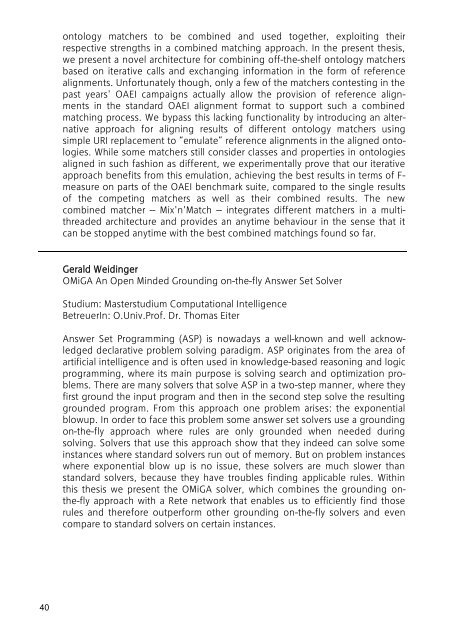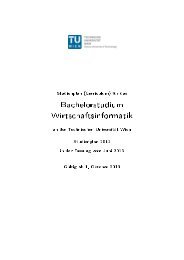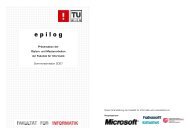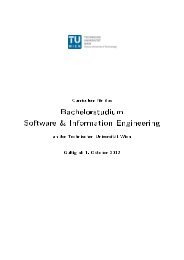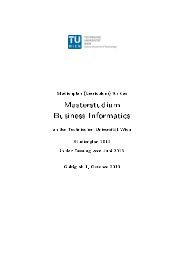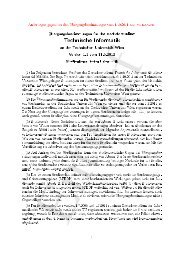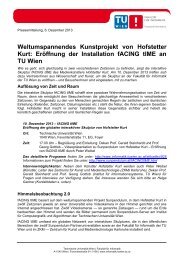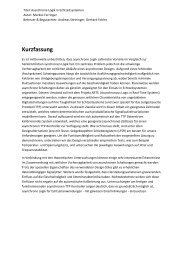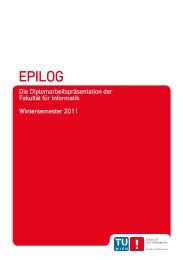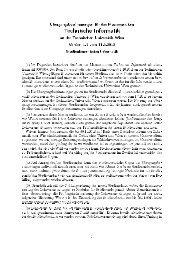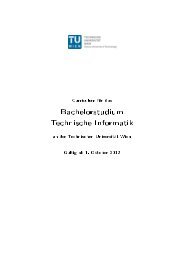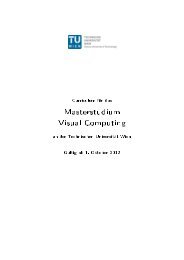Abstract-Band - Fakultät für Informatik, TU Wien - Technische ...
Abstract-Band - Fakultät für Informatik, TU Wien - Technische ...
Abstract-Band - Fakultät für Informatik, TU Wien - Technische ...
Sie wollen auch ein ePaper? Erhöhen Sie die Reichweite Ihrer Titel.
YUMPU macht aus Druck-PDFs automatisch weboptimierte ePaper, die Google liebt.
ontology matchers to be combined and used together, exploiting their<br />
respective strengths in a combined matching approach. In the present thesis,<br />
we present a novel architecture for combining off-the-shelf ontology matchers<br />
based on iterative calls and exchanging information in the form of reference<br />
alignments. Unfortunately though, only a few of the matchers contesting in the<br />
past years' OAEI campaigns actually allow the provision of reference alignments<br />
in the standard OAEI alignment format to support such a combined<br />
matching process. We bypass this lacking functionality by introducing an alternative<br />
approach for aligning results of different ontology matchers using<br />
simple URI replacement to “emulate” reference alignments in the aligned ontologies.<br />
While some matchers still consider classes and properties in ontologies<br />
aligned in such fashion as different, we experimentally prove that our iterative<br />
approach benefits from this emulation, achieving the best results in terms of F-<br />
measure on parts of the OAEI benchmark suite, compared to the single results<br />
of the competing matchers as well as their combined results. The new<br />
combined matcher -- Mix'n'Match -- integrates different matchers in a multithreaded<br />
architecture and provides an anytime behaviour in the sense that it<br />
can be stopped anytime with the best combined matchings found so far.<br />
Gerald Weidinger<br />
OMiGA An Open Minded Grounding on-the-fly Answer Set Solver<br />
Studium: Masterstudium Computational Intelligence<br />
BetreuerIn: O.Univ.Prof. Dr. Thomas Eiter<br />
Answer Set Programming (ASP) is nowadays a well-known and well acknowledged<br />
declarative problem solving paradigm. ASP originates from the area of<br />
artificial intelligence and is often used in knowledge-based reasoning and logic<br />
programming, where its main purpose is solving search and optimization problems.<br />
There are many solvers that solve ASP in a two-step manner, where they<br />
first ground the input program and then in the second step solve the resulting<br />
grounded program. From this approach one problem arises: the exponential<br />
blowup. In order to face this problem some answer set solvers use a grounding<br />
on-the-fly approach where rules are only grounded when needed during<br />
solving. Solvers that use this approach show that they indeed can solve some<br />
instances where standard solvers run out of memory. But on problem instances<br />
where exponential blow up is no issue, these solvers are much slower than<br />
standard solvers, because they have troubles finding applicable rules. Within<br />
this thesis we present the OMiGA solver, which combines the grounding onthe-fly<br />
approach with a Rete network that enables us to efficiently find those<br />
rules and therefore outperform other grounding on-the-fly solvers and even<br />
compare to standard solvers on certain instances.<br />
40


